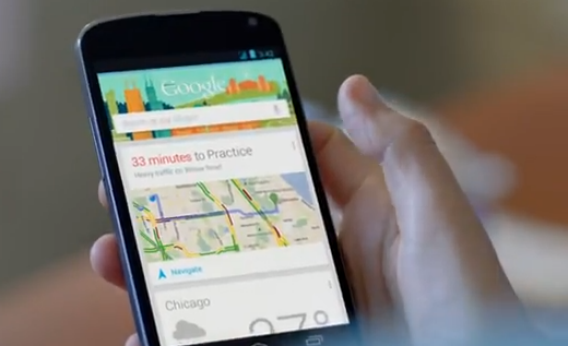Finally, a Google phone ad that emphasizes the Google more than the phone.
During Sunday night’s Grammys telecast, Google aired a new spot for its Nexus 4 smartphone that highlights how the company’s battle with Apple is shifting from the realm of hardware and apps to the that of artificial intelligence. The ad hardly shows the device at all. Instead, it focuses on Google Now, the search giant’s answer to Siri.
When it launched in 2011, Siri was billed as a serious threat to Google’s core search business, because it offered a different way to find information, one better suited to the mobile age. Instead of forcing you to type out keywords and sift through pages of results, it would just answer your questions like a human being. But it quickly became evident that Siri had a long way to go. And last year, Google responded with its own mobile personal assistant, called Google Now. The ad that Google ran Sunday night showed off several things that Google Now can do that Siri can’t, as TechCrunch’s Jordan Crook points out:
For example, if Google Now sees in my calendar that I plan on working out at noon today, but also sees that the train I usually take to the gym is experiencing delays, Google Now will let me know that I need to leave a bit earlier to make it there on time. …
I can ask Siri when my next appointment is, but she can’t help me plan the best time to leave for that appointment. She can’t even tell me if the train is delayed. And if I ask for the fastest train route to Union Square, I’m sent to Maps, and then directly into the App Store to buy some transit apps.
This may or may not be crucial to the future of smartphones, which have large enough screens that you can achieve most of the same results without too much fuss by tapping on a couple of apps. But it is almost certainly crucial to the longer-term future of mobile computing, a category that is already beginning to expand beyond phones to include smart watches and smart glasses. Imagine having to toggle between your calendar app, your maps app, and an app that keeps track of the latest train schedules on a wristwatch and the significance of Siri and Google Now starts to come into focus. This is why Google recently hired the famous artificial-intelligence researcher Ray Kurzweil. It’s also why Apple felt it had no choice but to build Apple Maps.
In short, the new Google ad serves notice that the mobile personal-assistant wars have begun.
